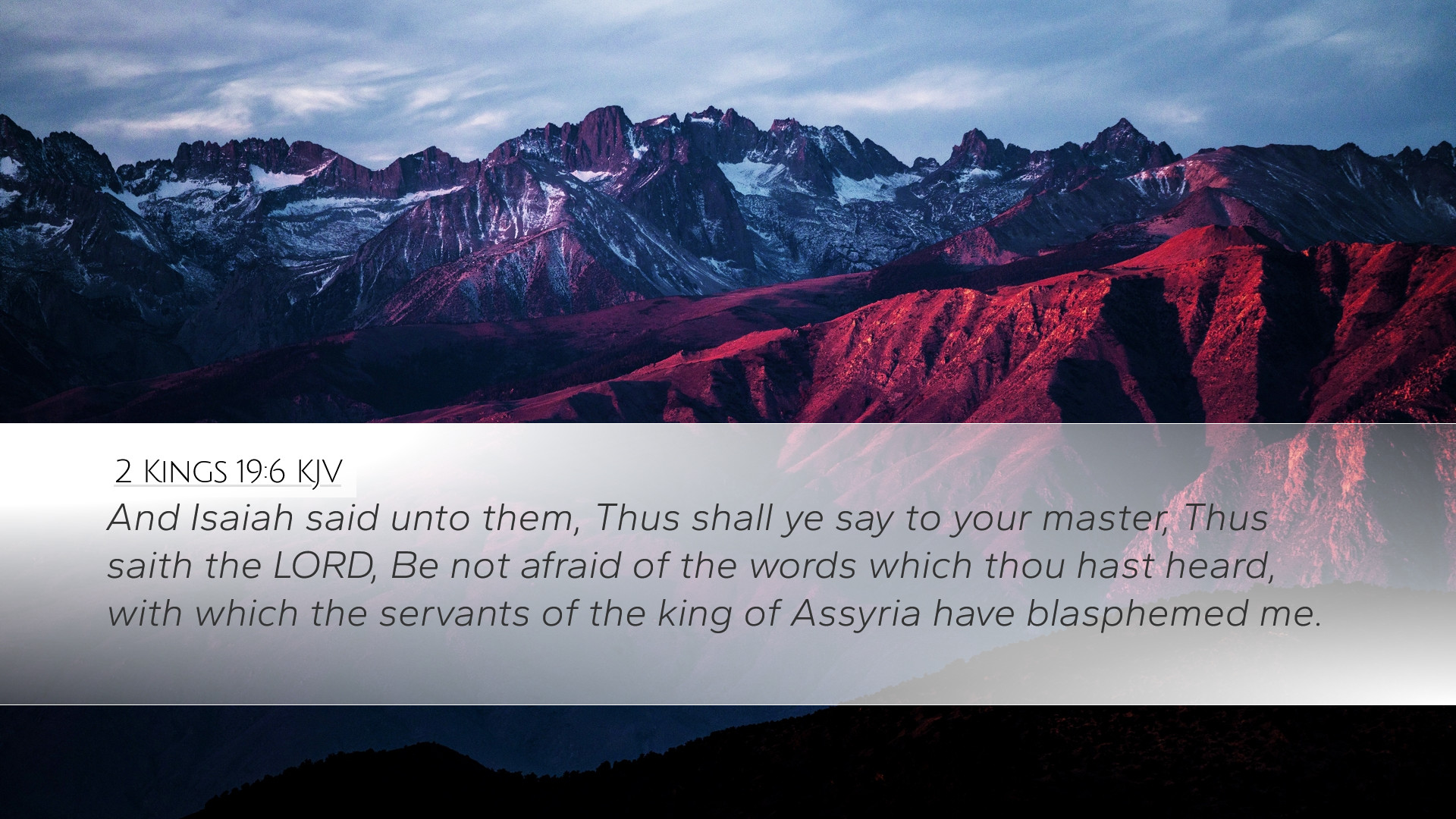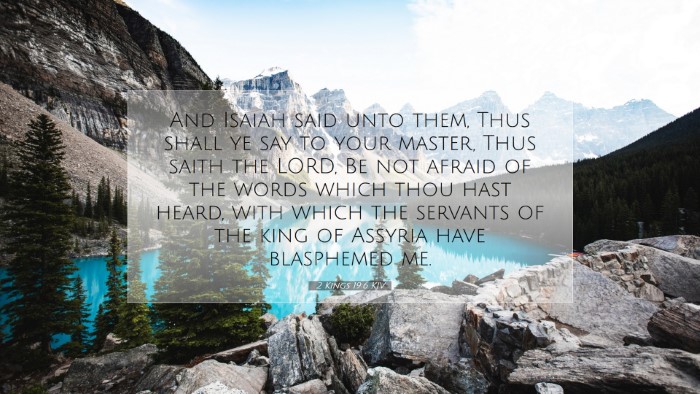Commentary on 2 Kings 19:6
Verse Reference: 2 Kings 19:6 - "And Isaiah said unto them, Thus shall ye say to your master, Thus saith the Lord, Be not afraid of the words which thou hast heard, with which the servants of the king of Assyria have blasphemed me."
Introduction
The context of 2 Kings 19 is pivotal in the narrative of Judah’s interactions with powerful enemies, particularly Assyria. In this verse, the prophet Isaiah conveys a message of divine reassurance amid a crisis. We shall explore this text through the lens of various public domain commentators, including Matthew Henry, Albert Barnes, and Adam Clarke, who provide depth and insight relevant to pastoral ministry, theological study, and academic reflection.
Divine Assurance Against Fear
Isaiah's proclamation opens with a direct command that encapsulates God's attitude towards fear—He explicitly instructs His people not to be afraid. This repetition of divine reassurance throughout biblical texts emphasizes the frequent human struggle against fear, particularly fear rooted in external threats.
- Matthew Henry notes that despite the overwhelming power of the Assyrians, the true strength of Judah lies in their relationship with God. He emphasizes that faith in God’s promises is essential to overcome fear.
- Albert Barnes highlights the importance of Isaiah’s role as a messenger of hope during a time of despair. He illustrates how God's communication through prophets serves to strengthen the faithful in times of crisis.
- Adam Clarke elaborates on the nature of the threats that the Assyrians posed, defining them as not just military, but as spiritual challenges against the very essence of trust in Yahweh. Clarke points out the blasphemous nature of their words, calling for a response of faith from the people.
Understanding the Context
To fully appreciate the exhortation found in this verse, it is necessary to understand the broader historical context. King Hezekiah of Judah faced an existential threat from the Assyrian king Sennacherib, who had a reputation for military prowess and brutal conquests.
The Assyrians employed psychological warfare, using blasphemies against the God of Israel to instill fear and doubt. Isaiah, as God’s mouthpiece, responds to the atmosphere of panic by reassuring Hezekiah of God’s ultimate sovereignty.
Theological Implications
This verse presents significant theological implications about God's sovereign authority amidst human conflict.
- The Sovereignty of God: Isaiah states, "Thus saith the Lord," signifying that God's word holds ultimate authority over every intimidating force. This underscores a recurring biblical theme: God’s will supersedes the plans of even the most powerful earthly rulers.
- The Role of Prophecy: The passage illustrates the function of prophetic ministry as both a warning and a source of hope. As noted by Clarke, the prophet’s role is vital in directing the people back to their reliance on God.
- Confronting Blasphemy: The blasphemous words uttered by the Assyrians not only challenge the fortitude of Hezekiah but also provoke divine engagement. God responds to human insult, revealing a commitment to protect His name and His people.
Practical Applications for Today
The teachings derived from 2 Kings 19:6 bear relevance in contemporary Christian life.
- Dealing with Fear: God’s exhortation to not fear resonates in today's society where various "giants" loom large. Believers are reminded to ground their faith in God’s promises rather than yielding to external pressures.
- The Importance of Prophetic Voices: Like Isaiah, there is a need for modern prophets—leaders who impart God's truth and encouragement. Pastoral leadership must echo the confidence found in God's sovereignty and inspire the congregation to respond in faith.
- Responding to Challenges: Just as Hezekiah sought counsel and direction from Isaiah, believers today are called to seek godly wisdom when faced with trials. This verse encourages a communal approach to struggles, reinforcing the value of seeking God's guidance through prayer and scripture.
Conclusion
2 Kings 19:6 encapsulates a vital moment of divine assurance against fear, revealing God's character as protector and sovereign lord amid adversity. Insights from commentators provide depth to the understanding of this passage, highlighting the enduring relevance of God's messages through the prophets. As the faithful draw upon these truths, they are equipped to face their challenges, standing firm in the knowledge that their God is greater than any threat they may encounter.


